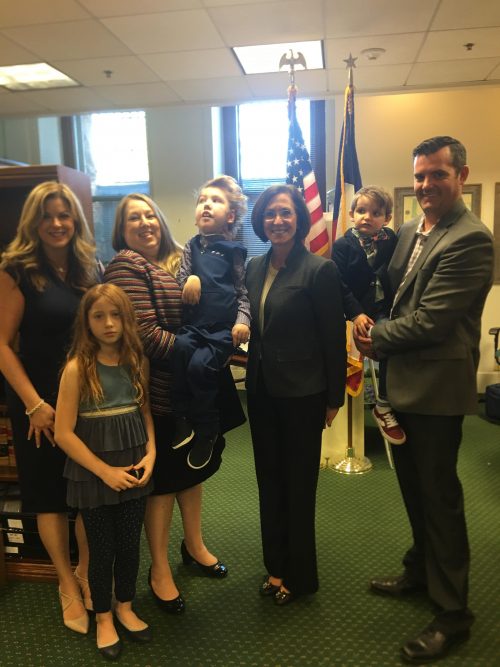AUSTIN (Nexstar) — Texas will soon join a handful of states in screening newborn babies for adrenoleukodystrophy, commonly known as ALD.
ALD is a rare genetic disease that occurs affects one in 18,000 people and occurs primarily in males. It destroys myelin, the membrane that serves as a protective sheath around the brain’s neurons, and impacts the nervous system and adrenal gland.
Eve Lapin, with the Stop ALD foundation, said this is a significant step for families in Texas. Lapin’s oldest son out of her three boys, Oliver, had ALD. She says he was misdiagnosed for several years.
“By the time he was correctly diagnosed, the disease had progressed so far that it was too late to do a transplant for him,” she said.
But what they learned from Oliver’s diagnosis was critical for other family members, she noted.

“Once he was diagnosed with ALD, then we learned what it was,” she said. “We had never heard it before. We had learned it was a genetic disease, so we got everybody in the family tested and found out one of my other sons had the ALD gene and my nephew also had the ALD gene. They were able to get stem cell transplants and cord blood transplants and they’re both doing pretty well.”
Oliver lived until he was 12. Lapin’s been active in reaching out to lawmakers to get ALD testing as a part of Texas’ Newborn Screening Panel. She works with the Stop ALD Foundation, which aims to help educate others about the disorder and raise funds for research.
“It is so important that Texas added ALD to the newborn screening so that boys don’t have to die needlessly and they could be treated early,” she said. “It’s really meaningful to me.”
The Texas Department of State Health Services Newborn Screening Program currently tests for 53 disorders. It also has point of care screening for two other disorders. The testing is required by law, unless the parent chooses not to have it done due to religious reasons.
However, Texas’ Newborn Screening Panel does not include all the disorders on the Recommended Uniform Screening Panel (RUSP) since implementation has been tied to the availability of state funding. The RUSP is the list of 61 core and secondary disorders from the Secretary of the Department of Health and Human Services recommended for states to have as part of their newborn screening programs. Right now, the conditions not screened for under Texas’ program include Pompe disease, MPS-1, ALD and Spinal Muscular Atrophy. ALD was added to the RUSP in 2016.
Lawmakers set aside $1.2 million for the implementation of ALD screening during the 85th legislative session and appropriated funding for ongoing testing costs in the supplemental budget from the 86th legislative session. They also passed legislation to create a Newborn Screening Preservation account, which will allow state health officials to maintain the screening laboratory and add new conditions to its program without having to seek funding from lawmakers each time. Another bill prevents health insurance plans from excluding or limiting coverage for newborn screenings.
“What it allows Texas to do is go from being a lagger in newborn screening in the U.S. to becoming a leader,” Khrystal K. Davis with the Texas Rare Alliance said.
Davis’ son, Hunter, has spinal muscular atrophy, or SMA. The disorder affects motor nerve cells in the spinal cord. It was added onto the RUSP in July 2018.
“When Hunter was diagnosed, newborn screening was not in place, so we went through that period recognizing that there was something severely wrong with Hunter and not knowing what it was,” she said.
She’s hopeful that the changes in Texas will mean parents can eventually get answers early on and they can find the right treatment and care for their children.

“It would really alleviate that period of frustration and agony where you don’t know what is going on with your child,” she said. “We can’t treat what we do not diagnose. It’s really important to diagnose these babies pre-symptomatically and provide these treatments when they will have the most efficacy.”
According to an update from Texas Health and Human Services, these additional funds will allow the state to start testing for ALD starting August 5.
“I’m really touched and glad,” Lapin said. “It’s emotional for me because I worked on it and also, if this was around when my son was born, he would still be alive and well now, but I’m glad all the future kids born in Texas will know.”




























